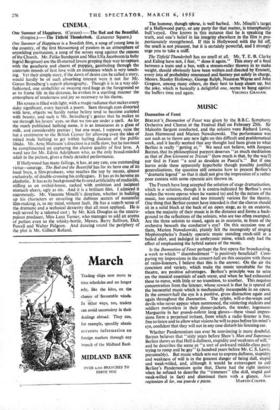CINEMA
One Summer of Happiness. (Curzon)—The Bad and the Beautiful. (Empire.)—The Titheld Thunderbolt (Leicester Square.) One Summer of Happiness is a Swedish film, a song of young love in the country, of the first blossoming of passion in an atmosphere of unyielding puritanism, a song of the senses sung against the canons of the Church. Mr. Folke Sundquist and Miss Ulla JacobssOn (a baby Ingrid Bergman) are the ill-starred lovers groping their way to rapture with the gaucherie and charm of puppies, gamboling through the uncertain moods of first love with an innocence which is very touch- ing. Yet their simple story, if the dawn of desire can be called a story, would hardly be of such absorbing interest were it not for Mr. Goran Strindberg's superb photography. Though it is in a way old- fashioned, one umbellifer or swaying reed huge in the foreground so as to frame life in the distance, he evokes in a startling manner the atmosphere of tenderness and joy so necessary to his theme.
His screen is filled with light, with a magic radiance that makes every daisy significant, every hayrick a poem. Seen through eyes distorted with love, objects we hardly notice before tend to become aurioled with beauty, and such is Mr. Strindberg's genius that he makes us see through his lovers' eyes, so that we too are under a spell. As for the much publicised bathing scene, it is as innocuous as a glass of milk, and considerably prettier ; but one must, I suppose, raise the hat a centimetre to the British Censor for allowing even the idea of mixed nude bathing to get within hailing distance of the public libido. Mr. Arne Mattsson's direction is a trifle slow, but he too must be complimented on capturing the elusive quality of first love. A word too for Mr. Edvin Adolphson who, as the only broad-minded adult in the picture, gives a finely detailed performance.
If Hollywood has many failings, it has, at any rate, one outstanding virtue—courage. The Bad and the Beautiful has for its hero one of its local boys, a film-producer, who reaches the top by means, almost exclusively, of double-crossing his colleagues. It has as its heroine an alcoholic. It has as its background the fevered artificiality of studio life, stifling as an orchid-house, racked with ambition and incipient stomach ulcers, ugly as sin. And it is a brilliant film. I admired it enormously. Mr. Vincente Minelli's direction, whether in building up his characters or unveiling the dubious secrets of successful film-making, is, to my mind, without fault. He has a superb sense of the dramatic and a technical dexterity that all must applaud. He is well served by a talented cast ; by Mr. Kirk Douglas as the unscru- pulous producer, Miss Lana Turner, who manages to add an aroma of pathos even to the whisky-bottle, Messrs. Barry Sullivan, Dick Powell and Walter Pidgeon. And dancing round the periphery of the plot is Mr. Gilbert Roland. The humour, though sparse, is well barbed. Mr. Minelli's target of a Hollywood party, or any party for that matter, is triumphantly bull's-eyed. One knows in this instance that he is speaking the truth, and one's belief in his integrity elsewhere in the film is pro- portionately strengthened. If this is Hollywood with the lid off, the smell is not pleasant, but it is certainly powerful, and i strongly urge you to take a sniff.
The Titfield Thunderbolt has no smell at all. Mr. T. E. -B. Clarke and Ealing have not, I fear, " done it again." This story of a feud between, a train and a bus, with a stream-roller thrown in to make weight, should obviously have been written and directed by Emmett, every iota of probability renounced and fantasy put solely in charge. Messrs. Stanley Holloway, George Relph, Naunton Wayne and John Gregson, among many others, do their best to keep steam up, but the joke, which is basically 'a delightful one, seems to bang against


































 Previous page
Previous page